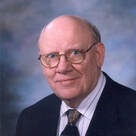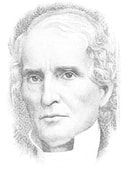Hebrews 11
|
Hebrews 11:4:
By faith Abel offered unto God a more excellent sacrifice than Cain, by which he obtained witness that he was righteous, God testifying of his gifts: and by it he being dead yet speaketh |
 John Stevens John Stevens
Abel is presented in Hebrews 11v4 as an example of faith, implicitly in contrast to Cain who is an example of unbelief. It is important to appreciate that Hebrews 11 is using faith in a very specific sense, rather than generically. In Hebrews 11 faith is trust and confidence in God’s promise of eternal reward for perseverance. The author is exhorting his readers to persevere in their faith in Jesus so as to enter the eternal inheritance he promises. Faith trusts in the unseen (and hence not presently experienced) future, and lives sacrificially on the basis of it.
Given this understanding of faith, the author says that Abel brought God a ‘better sacrifice.’ The sacrifice is not simply better because he had faith, although faithless sacrifice would not be pleasing to God (Hebrews 11v6). The phrase ‘better’ carries the sense of ‘greater’ or ‘more.’ The author is highlighting the superiority of the offering that Abel brought because he was sure that it would result in an eternal reward. The author of Hebrews expands on the hints in the account of Genesis 4 that indicate the nature of Abel’s superior sacrifice. It is possible that the sacrifice was superior because it was animal rather than cereal. It required shed blood, which Hebrews maintains is essential for the forgiveness of sin. Abel’s sacrifice may thus have indicated his awareness of his need for cleansing before God. However, the text seems to highlight two other differences ahead of this. First, Cain’s offering was singular, whereas Abel’s offering was plural. Second Abel’s offering is explicitly said to have been of the ‘firstborn’ whereas Cain is not said to have brought an offering of the ‘first fruits’ of the soil. The text, therefore, indicates that Abel’s sacrifice was more valuable and more costly than that of Cain. He made multiple offerings (all the firstborn from the flock) and he put God’s rights ahead of his own profit. Cain appears to have given God what he thought he could get away with, rather than what God is worth. Abel gave far more because he knew that he would gain something far greater in the end. The point Hebrews is making is that Abel was willing to make a more costly sacrifice because he had faith that his act of devotion would be rewarded. Hebrews 11v6 explains the faith of Abel and Enoch. They both earnestly sought God (which means more literally that they drew near to him) and they believed that he would reward them. Abel lost his life because of his persevering faith, but he gained God’s commendation and an eternal reward. The lesson that we need to learn is that persevering faith, which results in sacrificial and costly action (such as refusing to apostatise in the face of persecution), is made possible by confident trust in the promise of eternal reward. This is the message of Hebrews 11 illustrated from multiple examples. --John Stevens; Dissenting Opinion; Exegetical Thoughts: Hebrews 11v4 - Why Was Abel's Sacrifice Better Than Cain's 5.3.23 |
|
Hebrews 11:6:
But without faith it is impossible to please Him, for he who comes to God must believe that He is, and that He is a rewarder of those who diligently seek Him. |
 Andy Naselli Andy Naselli
Someone who once professed to be a Christian may become apostate. But a genuine Christian cannot become apostate. Those who apostatize demonstrate that they were never genuine Christians: “They went out from us, but they were not of us; for if they had been of us, they would have continued with us. But they went out, that it might become plain that they all are not of us” (1Jn 2:19). -Andy Naselli; Gospel Coalition; What Is Apostasy? Can a Christian Become Apostate?
|
 V Raymond Edman
V Raymond Edman
"The things which are seen are temporal," declares II Corinthians 4:18, "but the things which are not seen are eternal." Better then any material heritage that we can pass on to our children is the unwavering assurance that God will also be their God, even unto death. Wealth and health may not be their abiding portion, fortune and fame they may never have; but if only we, like Jacob, have brought them into acquaintance with the God of salvation, then they in their generation will find Him to be their unfailing Helper. They will know, as we have learned, that "he that cometh to God must believe that he is, and he is a rewarder of them that diligently seek him." (Heb 11:6). -V Raymond Edman; But God!; 1962
 Jack De Jong
Jack De Jong
"....prayer in the life of a believer is often filled with many obstacles. The power of sin and the power of the devil try to block our prayers and lead our minds away from the Lord. Confusion and laziness attack us, and often we just don't take the time to pray. We are always in a hurry. Then there is the doubt, heaviness and melancholy of our hearts — sometimes we are just not in the mood to pray, and if we pray, we pray in doubt. (Heb. 11:6, Ja. 5:3) Our cares and concerns often become an obstacle to prayer, as well as our relation to our neighbours in the Lord. For if one cannot ensure the correct relation to his neighbour, it is impossible to have the correct relationship with God. (1 Peter 3:7).
All of these obstacles are real in our life, and we experience them in a way similar to what we read in the psalms of David, and in the cries of God's people. At one time or another, we all meet with turmoil and distress. And we must struggle daily with the weaknesses of our flesh. How then can we be sure that our prayers will be heard by the Lord? When we notice how great the differences are between the sort of prayer the Lord wants and our actual prayer, should that lead us to despair? Or can we expect the differences to be removed?
Yes, we may be assured that the Lord will remove those differences, if only we trust in Him, and believe in His Name. For the Lord Jesus (lid not teach prayer for nothing; He wants His disciples to pray, not as the Pharisees did, but in the way He taught them. Prayer doesn't come naturally; it requires training and discipline to pray correctly. Our hearts and lips must be circumcised, as Isaiah says. We must continually struggle to pray as we ought to pray.
As we grow in learning to pray, the Lord still accepts our prayers, even with their many faults and shortcomings. Why? Because the covenant promises of the Lord still stand. He still listens to His people for the sake of His steadfast love, and on account of His covenant promises that were sealed to us at our baptism. We can pray today and still be heard because, as we saw, this is the dispensation of Pentecost. The Holy Spirit no longer dwells with the Father, but now dwells and works in us through the preaching of the Word. He helps is in our prayers — He leads us to the prayer bench. He gives us the words to pray, and when we can't find the words, He still prays for us.
The Holy Spirit speaks for us to the Father, on the basis of the work of the Son. For, as Paul says, "we do not know how to pray as we ought, but the Spirit himself intercedes for us with sighs too deep for words." (Rom. 8:26) And because He intercedes for us, all our prayers are answered. There is no such thing as an unanswered prayer. All else may fail, but our mumbling, our sporadic groaning, indeed, even our "brullen" will be heard by the Father, for the sake of His Son.
For He cares for us, and bends down to help us for His Son's sake. He visits us and unifies the 'ought' of prayer with our actual prayers. He unifies our words and deeds, our thoughts and actions. By the grace of His Spirit, he unifies our whole life, and so leads all of His children unto the end, when the prayers of the whole church shall be answered in full, and He will be all in all.
- Jack De Jong; Spindle Works; Prayer & The Christian 3/15/75
All of these obstacles are real in our life, and we experience them in a way similar to what we read in the psalms of David, and in the cries of God's people. At one time or another, we all meet with turmoil and distress. And we must struggle daily with the weaknesses of our flesh. How then can we be sure that our prayers will be heard by the Lord? When we notice how great the differences are between the sort of prayer the Lord wants and our actual prayer, should that lead us to despair? Or can we expect the differences to be removed?
Yes, we may be assured that the Lord will remove those differences, if only we trust in Him, and believe in His Name. For the Lord Jesus (lid not teach prayer for nothing; He wants His disciples to pray, not as the Pharisees did, but in the way He taught them. Prayer doesn't come naturally; it requires training and discipline to pray correctly. Our hearts and lips must be circumcised, as Isaiah says. We must continually struggle to pray as we ought to pray.
As we grow in learning to pray, the Lord still accepts our prayers, even with their many faults and shortcomings. Why? Because the covenant promises of the Lord still stand. He still listens to His people for the sake of His steadfast love, and on account of His covenant promises that were sealed to us at our baptism. We can pray today and still be heard because, as we saw, this is the dispensation of Pentecost. The Holy Spirit no longer dwells with the Father, but now dwells and works in us through the preaching of the Word. He helps is in our prayers — He leads us to the prayer bench. He gives us the words to pray, and when we can't find the words, He still prays for us.
The Holy Spirit speaks for us to the Father, on the basis of the work of the Son. For, as Paul says, "we do not know how to pray as we ought, but the Spirit himself intercedes for us with sighs too deep for words." (Rom. 8:26) And because He intercedes for us, all our prayers are answered. There is no such thing as an unanswered prayer. All else may fail, but our mumbling, our sporadic groaning, indeed, even our "brullen" will be heard by the Father, for the sake of His Son.
For He cares for us, and bends down to help us for His Son's sake. He visits us and unifies the 'ought' of prayer with our actual prayers. He unifies our words and deeds, our thoughts and actions. By the grace of His Spirit, he unifies our whole life, and so leads all of His children unto the end, when the prayers of the whole church shall be answered in full, and He will be all in all.
- Jack De Jong; Spindle Works; Prayer & The Christian 3/15/75

Like Moses, those who have found favor with God constantly cry out, “Please show me your glory” (Exodus 33:18). Like David, those who have found him seek just “one thing”: “that I may dwell in the house of the Lord all the days of my life, to gaze upon the beauty of the Lord, and to inquire in his temple” (Psalm 27:4). Like Paul, those who know God make it their life’s work to know God more (Philippians 3:10). Eternal life is defined not by its length but by its content: “This is eternal life, that they know you, the only true God, and Jesus Christ whom you have sent” (John 17:3). --Desiring God
 John MacArthur
John MacArthur
We've seen that without faith it's impossible to please God. And the first step in faith is believing that God exists. In addition, we must also believe that He answers our prayers—more specifically, that He redeems those who come to Him in faith.
Scripture repeatedly tells us that God not only can be found, but also desires to be found. David said to his son Solomon, "If you seek Him, He will let you find Him; but if you forsake Him, He will reject you forever" (1 Chron. 28:9). The Lord says in Jeremiah 29:13, "You will seek Me and find Me, when you search for Me with all your heart." Jesus said, "Everyone who asks, receives; and he who seeks, finds; and to him who knocks, it shall be opened" (Luke 11:10). At first glance those verses may seem to contradict Paul's teaching that "there is none who seeks for God; all have turned aside" (Rom. 3:11-12), and Jesus' statement that no one can come to Him unless the Father draws him (John 6:44). But really they're two sides of the same theological coin. On one side you see man believing God and receiving Christ for salvation. On the other you see God enabling man to do so. Prior to salvation, a person is spiritually dead and utterly incapable of responding to the gospel. God must grant him or her saving faith. That's why the Bible contains statements like, "To you it has been granted for Christ's sake . . . to believe in Him" (Phil. 1:29); "As many as had been appointed to eternal life believed" (Acts 13:48); and "The Lord opened [Lydia's] heart to respond to the things spoken by Paul" (Acts 16:14).
God is the Great Rewarder, extending His love and grace to all who call upon Him. "Whoever believes in Him will not be disappointed" (Rom. 10:11).
Suggestions for Prayer
If you've been praying for someone's salvation, don't become discouraged. Only God can grant saving faith, but He gives us the privilege of participating in His redemptive work through faithful prayer and evangelism (Rom 10:1). --From Drawing Near by John MacArthur Copyright © 1993.
Scripture repeatedly tells us that God not only can be found, but also desires to be found. David said to his son Solomon, "If you seek Him, He will let you find Him; but if you forsake Him, He will reject you forever" (1 Chron. 28:9). The Lord says in Jeremiah 29:13, "You will seek Me and find Me, when you search for Me with all your heart." Jesus said, "Everyone who asks, receives; and he who seeks, finds; and to him who knocks, it shall be opened" (Luke 11:10). At first glance those verses may seem to contradict Paul's teaching that "there is none who seeks for God; all have turned aside" (Rom. 3:11-12), and Jesus' statement that no one can come to Him unless the Father draws him (John 6:44). But really they're two sides of the same theological coin. On one side you see man believing God and receiving Christ for salvation. On the other you see God enabling man to do so. Prior to salvation, a person is spiritually dead and utterly incapable of responding to the gospel. God must grant him or her saving faith. That's why the Bible contains statements like, "To you it has been granted for Christ's sake . . . to believe in Him" (Phil. 1:29); "As many as had been appointed to eternal life believed" (Acts 13:48); and "The Lord opened [Lydia's] heart to respond to the things spoken by Paul" (Acts 16:14).
God is the Great Rewarder, extending His love and grace to all who call upon Him. "Whoever believes in Him will not be disappointed" (Rom. 10:11).
Suggestions for Prayer
If you've been praying for someone's salvation, don't become discouraged. Only God can grant saving faith, but He gives us the privilege of participating in His redemptive work through faithful prayer and evangelism (Rom 10:1). --From Drawing Near by John MacArthur Copyright © 1993.
Jan 8, 2022: St. Mark M.B. Church: Weekly Challenger: Facing What’s Forward – Hebrews 11:1- 6
As we look back over the past 365 days, we can reflect on the goodness of God and how He has opened various doors for us through “teeny” doors (seconds), “tiny” doors (minutes), “mini” door (hours) small doors (days), medium doors (weeks) and large doors (months) which ultimately brought varying experiences to our lives. We know that not everything was pleasant or peaceful, but as we reflect we can certainly attest to the fact that God has been good!
As we look back over the past 365 days, we can reflect on the goodness of God and how He has opened various doors for us through “teeny” doors (seconds), “tiny” doors (minutes), “mini” door (hours) small doors (days), medium doors (weeks) and large doors (months) which ultimately brought varying experiences to our lives. We know that not everything was pleasant or peaceful, but as we reflect we can certainly attest to the fact that God has been good!
|
Hebrews 11:9-10:
By faith he dwelt in the land of promise as in a foreign country, dwelling in tents with Isaac and Jacob, the heirs with him of the same promise; 10 for he waited for the city which has foundations, whose builder and maker is God. |
 Sam Powell Sam Powell
“How you are fallen from heaven, O Lucifer, son of the morning! How you are cut down to the ground, You who weakened the nations! For you have said in your heart: ‘I will ascend into heaven, I will exalt my throne above the stars of God; I will also sit on the mount of the congregation On the farthest sides of the north; I will ascend above the heights of the clouds, I will be like the Most High.’ Yet you shall be brought down to Sheol, To the lowest depths of the Pit. (Isaiah 14:12–15)
Notice the echoes of the same themes—the tower reaching to heaven. We will be like the most high. We will exalt our throne. We will sit on the mount of the congregation of the Lord. Read the whole chapter. Isaiah is speaking about the spirit that drives Babylon, and every kingdom of this earth. In other words, “We will establish the kingdom of God on this earth. We will build cities. We will pass laws. We will deal with evil-doers. We will create a society, a City on the Hill. And there will be no more curse.” View it from the backdrop of the description of Babel. This is a major theme throughout the Bible, but I only want to focus on one aspect of it. The Tower was built with bricks and mortar, and the original readers of Genesis would have known exactly what that meant. Someone had to make the bricks and build the buildings. That would not have been Pharaoh, the one with the grand plan. It would have been the slaves. And so comes the downfall of every single scheme to build the kingdom of God on this earth. Someone has to make the bricks. Even the founding of our own country, which many claim is the “City on the Hill”, using the phrase of the puritans. Who did the work? Dabney complained after the slaves were set free that he hardly had time to write anymore because of all the menial labor that wasn’t getting done. In our own state, the California Indians were enslaved to harvest the crops and build the cities. The adobe houses weren’t going to build themselves. The “City on the Hill” is a grand idea, until you think about who is making the bricks. One thing is for sure. The one who says, “Come let us make bricks” is NOT the one who is actually making the bricks. The one who holds the whip is the one giving the commands. The one at the other end of the whip is making the bricks. At the end of Genesis 11, there is a contrast. We are introduced to a new character. Abraham. God gives Abraham a promise and Abraham believes it. And he learns to wait for it. Hebrews 11 tells us this: By faith he dwelt in the land of promise as in a foreign country, dwelling in tents with Isaac and Jacob, the heirs with him of the same promise;10 for he waited for the city which has foundations, whose builder and maker is God. (Hebrews 11:9–10) Abraham lived in tents his whole life, because he waited for another kind of city. A city where God makes the bricks and builds the city. Dwell on that for a moment. There is no oppression, no vanity under the sun, no pain and toil. And truly no more curse. No curse for anyone, for God will take it on himself. HE makes the bricks and prepares a place for you. And you can dwell in a tent while you wait, if that is what it takes. THIS is the kingdom of God. --Sam Powell; Lambs Reign Who’s Building The Bricks Of Nationalism? 11.2.22 |
|
Hebrews 11:11:
By faith Sarah herself also received strength to conceive seed, and she bore a child when she was past the age, because she judged Him faithful who had promised. |
|
 John Gill
John Gill
Through faith also Sarah herself,.... Some copies add "being barren"; and so read the Vulgate Latin, and all the Oriental versions; which is a circumstance which makes her faith appear the greater: but it is a question whether the apostle speaks of the faith of Sarah, or of Abraham; some think he speaks of Abraham's faith; and that it was through his faith that Sarah conceived; and observe, that the last clause may be rendered, "because he judged him faithful", &c. and the rather, because the apostle, both before and after, is speaking of Abraham's faith, Hebrews 11:8. And in Hebrews 11:12 mention is made only of one, even of Abraham; and in Romans 4:17 only notice is taken of Abraham's faith, respecting this matter; nor is Sarah's faith observed in the history of it, but her diffidence: but why may not Sarah be joined with Abraham, in this commendation, as well as Isaac and Jacob? and though, at first, she distrusted, yet she afterwards feared, and believed: other women are mentioned in this catalogue of believers; and they share in the same grace and privileges as men: and Sarah, being a believer, as well as Abraham.
--John Gills Exposition of the Bible
--John Gills Exposition of the Bible
|
Hebrews 11:16:
But now they desire a better country, that is, an heavenly: wherefore God is not ashamed to be called their God: for he hath prepared for them a city. |
Rahab is a problem to many people on two counts. First, she was a harlot. Every kind of Strained exegesis has been resorted to in order to turn her into an innkeeper instead, but the Scripture is clear: she was a harlot. Second, her lie to the king of Jericho's officers is uniformly condemned by the legalists, even though it is specifically cited as a virtue by James (James 2:17-26).
It is important to realize that the Bible is never academic; it never provides information merely to satisfy our curiosity. In fact , it avoids satisfying our curiosity again and again, because its purpose is rather to instruct and to reshape us ever more closely into conformity in God's word, law, and image.
It is important to realize that the Bible is never academic; it never provides information merely to satisfy our curiosity. In fact , it avoids satisfying our curiosity again and again, because its purpose is rather to instruct and to reshape us ever more closely into conformity in God's word, law, and image.
 Warren Wiersbe
Warren Wiersbe
“The Lord prepared Moses for his ministry and took eighty years to do it. He was raised as a prince in Egypt and taught all that the wise men in Egypt knew. Some scholars believe that Moses was in line to be the next Pharaoh. Yet Moses gave all this up to identify with the people of God in their suffering (Heb. 11:24–27). God gave Moses a forty-year “post-graduate course” as a shepherd in the land of Midian, a strange place for a man with all the learning of Egypt in his mind. But there were lessons to be learned in solitude and silence, and in taking care of ignorant sheep, that Moses could never have learned in the university in Egypt. God has different ways of training His servants, and each person’s training is tailor-made by the Lord.”
― Warren W. Wiersbe, Be Equipped (Deuteronomy): Acquiring the Tools for Spiritual Success
― Warren W. Wiersbe, Be Equipped (Deuteronomy): Acquiring the Tools for Spiritual Success
 Albert Barnes
Albert Barnes
Even "her" strong incredulity was overcome, and though everything seemed to render what was announced impossible, and though she was so much disposed to laugh at the very suggestion at first, yet her unbelief was overcome, and she ultimately credited the divine promise. The apostle does not state the authority for his assertion that the strength of Sarah was derived from her faith, nor when particularly it was exercised. The argument seems to be, that here was a case where all human probabilities were against what was predicted, and where, therefore, there must have been simple trust in God. Nothing else but "faith" could have led her to believe that in her old age she would have borne a son.
When she was past age - She was at this time more than ninety years of age; Genesis 17:17; compare Genesis 18:11.
Because she judged him faithful who had promised - She had no other ground of confidence or expectation. All human probability was against the supposition that at her time of life she would be a mother.
When she was past age - She was at this time more than ninety years of age; Genesis 17:17; compare Genesis 18:11.
Because she judged him faithful who had promised - She had no other ground of confidence or expectation. All human probability was against the supposition that at her time of life she would be a mother.
Hebrews 11:35-38:
35 Women received their dead raised to life again: and others were tortured, not accepting deliverance; that they might obtain a better resurrection:
36 And others had trial of cruel mockings and scourgings, yea, moreover of bonds and imprisonment:
37 They were stoned, they were sawn asunder, were tempted, were slain with the sword: they wandered about in sheepskins and goatskins; being destitute, afflicted, tormented;
38 (Of whom the world was not worthy:) they wandered in deserts, and in mountains, and in dens and caves of the earth.
35 Women received their dead raised to life again: and others were tortured, not accepting deliverance; that they might obtain a better resurrection:
36 And others had trial of cruel mockings and scourgings, yea, moreover of bonds and imprisonment:
37 They were stoned, they were sawn asunder, were tempted, were slain with the sword: they wandered about in sheepskins and goatskins; being destitute, afflicted, tormented;
38 (Of whom the world was not worthy:) they wandered in deserts, and in mountains, and in dens and caves of the earth.













